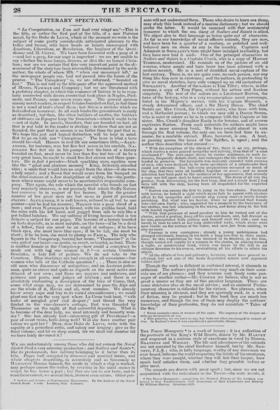LITERARY SPECTATOR.
" La Conspiration, ou Van mil huit cent vingt un."—This is the title, or rather the first part of the title, of a new Parisian novel, by the Duke de LEVIS, which at the moment we write is the
subject of some pretty considerable anticipated pleasure to the belles and beaux, who have heads or hearts unoccupied with
Jesuitism, Liberalism, or Revolution, the bugbear of the Quoti- dienne and M. Corru. We have been favoured with a peep of it —and but a peep, for our copy is imperfect : we are yet unable to say whether the hero hangs, drowns, or dies like an honest Chris- tian; nor are we certain that this very important point in the de- nouement of the story has been irrevocably determined by the noble author, the whole of whose MS. "when our messenger left," as the newspaper people say, had not passed into the hands of the printer. " The Conspiracy" is, we are informed, " founded on fact." This is not told in the title-page after the approved method of Messrs. NEWMAN and Company ; but we are threatened with a prefatory chapter, in which this romance of history is to be regu- larly connected with divers events that took place in Naples, Pied- mont, and France, some seven years ago. The general opinion among novel-readers, in respect to tales founded on fact, is that there is not a word of truth about them : but this is a mistake which we feel called on to correct. In all such books the groundwork is really as described ; but then, like other builders of castles, the builders of chdteaux en Espagne keep the foundation—where it ought to be —out of sight. In novels, therefore, that are founded on fact, all that is not told to the reader is sterling : in those that are not so founded, the part that is unseen is no better than the part that is. We hope this just and logical distinction will be kept in mind. But to go on with our " Conspiracy." The hero is what a hero should be—tall. Heroes in real life are sometimes little,—ALEX- ANDER, for instance, was but five feet seven in his sandals, NA- POLEON five feet six in his pumps : but the hero of a history founded on fact, must never be less than five feet ten—if he be a very great hero, he ought to stand five feet eleven and three quar- ters. He isjitit peindre—black sparkling eyes, aquiline nose like the " great and glorious memory " King, delicately chiselled chin ; a smile that would lure an angel from the skies—if she were a lady angel ; and a frown that would scare from his banquet on the dried carcass of a Jew stockjobber of eighty, the—the gentle- man whose name ought never to be mentioned in respectable com- pany. This again, the rule which the novelist who founds on fact very regularly observes, is not precisely that which thrifty Nature has recourse to in respect of her heroes. By far the greater number of her great men are but so-so in point of personal charms : ALEXANDER, it is well _known, refused to sit but to one painter—and he had his reasons ; NELSON was a poor shred of a man ; and even NAPOLEON le Grand, with his godlike head, held the reins with his left hand, and jogged from side to side like a pot-bellied butcher. We say nothing of living heroes—that is too delicate a subject for our pages. The heroine of a history founded on facts depends, as is most suitable, on the hero—if he be a devil. of a fellow, then she must be an angel of softness ; if he have black eyes, she must have blue eyes ; if he be tall, she must be. short ; if he be lean, she must he plump as PASTA. The lady who figures in the Conspiracy, barring her name, "Thomasine !" is the very girl of our heart—so gentle, so sweet, so tearful, so fond. There is another female in the Conspiracy—how could a conspiracy be made out with but one woman in it ?—a certain Countess Gradiska, a lady full of politics. We do not take to the Countess. Blue stockings are bad enough in all conscience—but women who talk of the Catholic question ! . . . There is also an old man who discourses of antiquities ; and an Austrian police- man, quite as clever and quite as roguish as the most active and diligent of our own ; and there are mayors and midwives, and painters and poets, and judges ad libitum ; and there is so absolutely enchanting a description of the lake of Como, that, come what come may, we are determined to pass the Alps and see the whole of it, Blevio and all, next summer. We already know every cape and bay in its varied circumference ; we could plant our foot on the very spot where La Cesia took boat, " with looks of mingled grief and despair ;" and thread the very thicket to the vine-dresser's cottage, that was threaded by Thomasine on the night of that sorrowful departure. What is to become of the clear lady, we most intensely and honestly won- der ? She has already had—interesting gift of Providence !—a pair of sweet twins, both doing well ! Will she have another pair before we quit her? Dear, dear Duke de LEVIS, write with the rapidity of a periodical critic, and satisfy our longing; give us the third volume, and let us sleep sound, for we shall but slumber till we have fairly devoured it !


















 Previous page
Previous page